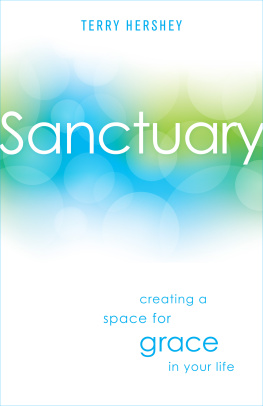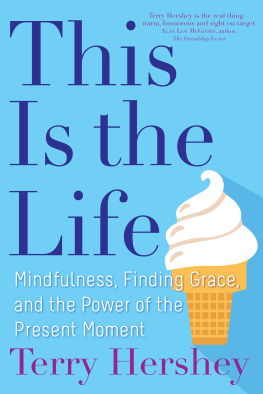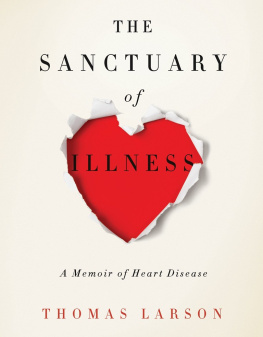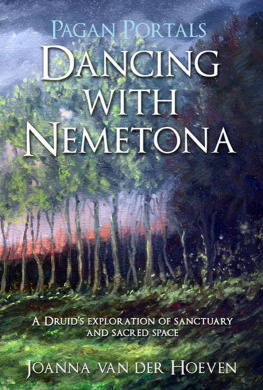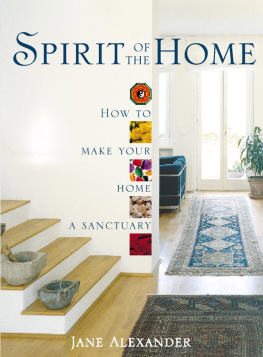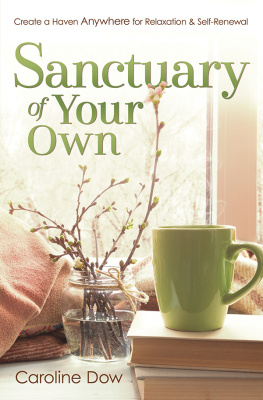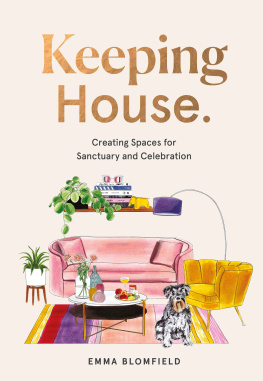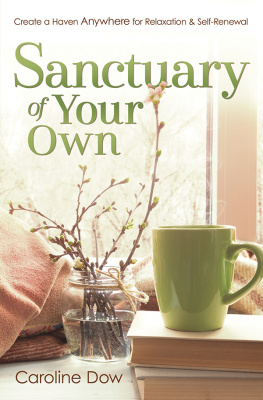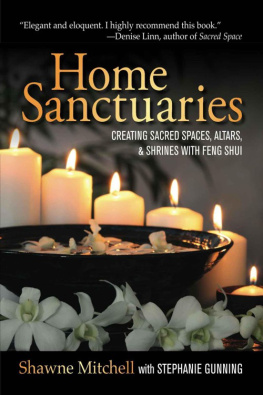It Began
with a Porch
Swing
In the latter years of her life , in the backyard of her home in northern Florida, my grandmother had a porch swing. She liked to sit and swing and hum old church hymns such as Rock of Ages, Cleft for Me. I can still see her there, wearing a white scarf over her head, a concession to chemotherapys unrelenting march. When as a young adult I visited her, she would always ask me to sit with her on the swing for a spell. She would pat my leg and call me darlin.
As long as my grandmother livedand in spite of her painthere was always a place for me on the swing. If I were asked to explain grace, I would paint the picture of my grandmothers swing. There, I never had to deliberate or explain or worry, regardless of the weight I carried. The porch swingmy grandmothers presencebestowed grace without conditions.
And I am here today because of that porch swing. I am here today because of a sanctuary.
Everyone has a sanctuary, if only in the mind. Even if we cant say what it is, we know of its power. It is a place where we feel grounded, unhurried, and renewed. We go there whenever we can, which never seems often enough. Or thats what we tell ourselves.
A sanctuary is a place that restores us, replenishes us, nourishes us. In this renewal, we are reminded, once again, of what really is important.
We are wired to need grounding and renewal. Yes, I believe its in our emotional DNA. So youd think creating sanctuary would be at the top of our priorities. But theres the sticky wicket. We end up making choiceswith our time and with our daysthat are detrimental to our emotional and spiritual well-being.
If I had my druthers, Id put my pen down (yes, I still write with a fountain pen) and invite you to take a walk with me. Were not going far. Off to the side of my garden and tucked under a maple tree is a swing. Its for cogitating and sitting for a spell.
I can tell the weeks when I do not get my recommended dose of sanctuaryor in my case, garden time. And I can tell when I do take my sanctuary time because it restores me; its a dose of grace mainlined straight to the heart.
In her book The Sabbath World, Judith Shulevitz quotes a lovely teaching by the eighteenth-century master the Vilna Gaon. Consider the mystery surrounding the first Shabbat. Why did God stop, anyway? God stopped to show us that what we create becomes meaningful only once we stop creating it and start remembering why it was worth creating in the first place. Shulevitz closes by saying, We have to remember to stop because we have to stop to remember.
We stop to create sanctuary. In sanctuary, we let life inevery bit of life, wholeheartedly, whether that is grief or sadness or bewilderment or gladness or joy.
We make space in which to see and to be seen. We make space to welcome. We make space to be Sabbath in a world of disquiet, disruption, and misgiving. We make space to offer comfort or reprieve or hope.
But how? How do we make that space? Where and when? If you picked up this little book, you probably feel the need for sanctuary. Maybe you have already stumbled upon it. Then again, maybe you need it but cant find it or dont know how to create it. In the chapters to come, we will explore sanctuary together. My hope is that by the end of this journey you will have found and reclaimed sanctuary where it already exists. Also, you will have purposeful ideas about how to create sanctuary right where you live, now.
But I have to warn you. Our journey together of creating sanctuary places will require a shift in the way you think about the concept of sanctuary. It will mean a new way of seeing. Because sanctuary is not a program to add to our to-do list. Sanctuary is a way of life. We may not be good at it or do it right, or we may give ourselves grief for lacking the willpower to commit and carry through. But who convinced us in the first place that those elements are essential? Is it possible to experience sanctuary when we arent very successful or correct or strong willed?
For now it is enough to accept this invitation to begin a journeya journey to create and embrace your sanctuary places, and to visit them often. You will be glad you did.
1
Who Needs
Sanctuary,
and Why?
Im eavesdropping , sitting in an airport shuttle, listening to two coworkers unpack their business trip. It was sooo great. I was always on the go. Didnt even get a chance to talk to my husband or kids. So I say to him, Im like... sorry.
Ask anyone, How are you? The responses range from super busy to crazy busy to insanely busy to you wouldnt believe it if I told you. Apparently nobody is just fine anymore.
My favorite answer, from asking a friend, is this: Im overscheduled, overcommitted, and overextended. Does that answer your question?
Yes, I tell him. But the good news is that your alliteration skills have not been affected.
Listening to the women on the shuttle, I smile, knowing that it could be me. Although Im sure that if I am overtaxed, theres a good reason for it. I must deserve it somehow. And yet, I know that, deep down, I dont want to live this way. I know that I need a sanctuary.
Apparently Im not the only one who needs sanctuary. There are anecdotes aplenty, and studies abound about the general state of things. Details in valuable books such as Carl Honores In Praise of Slowness and Brigid Schultes Overwhelmed: Work, Love, and Play When No One Has the Time reinforce what we all suspect: we are overwhelmed and overextended.
One study cited in the Schulte book, involving eleven experiments and seven hundred people, discovered that a majority of people found it unpleasant to be alone in a room with their thoughts for just six to fifteen minutes. Heres where it gets curious: many people actually preferred physical paindelivered via tiny doses of electrical shockto the emotional pain of sitting alone with no distractions.
Crazy? I dont know. You tell me. Are we perpetually on the run from boredom, requiring stimulus for its own sake? Or, when confronted with our busyness, do we assume we can replace it with different activities and exchange one distraction for another?
Its one thing to be bored; its another to add to the days obligations the need to feel important or the need to impress or the need to avoid the loneliness that emptiness can bring.
It seems clear that we have trained ourselves to avoid sanctuarythat time and place for stillness. But no matter who we are, we need that stillness more than ever. Every last one of us needs the restoration that sanctuary offers. Consider these people; you probably know them, and youre possibly one of them:
A man or woman in a significant, high-stress job who talks about the toll of the treadmill but is unable to get off
A mother or father in a family thats doing all right but whose long days and many responsibilities bring on anxiety, fatigue, and the recurring sense that something is missing
A recently divorced man or woman who feels betrayed and abandoned and whose anger is getting the better of him or her

